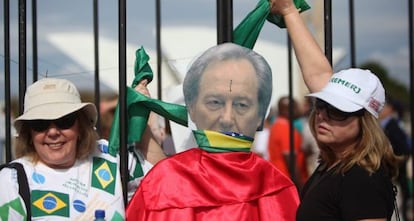Brazil’s Workers’ Party to take a hard look at itself following a wave of convictions
Rousseff’s grouping will discuss implementing internal reforms at upcoming convention


Brazil’s Workers Party (PT) – in office for the past 12 years with accomplishments that even the opposition doesn’t deny – will take advantage of its upcoming national convention to try to find explanations for the rise in the number of corruption cases, including convictions, which have engulfed the powerful leftist grouping.
For the first time, the PT will hold its convention without a host of its founding leaders and former party presidents present – they are all in jail following their convictions in a congressional payoff scandal known as the mensalão (monthly payment) case that rocked Brazil.
In 2003, the PT was the biggest leftist party in Latin America that emerged after dictatorship in Brazil between 1964 and 1985. After several unsuccessful bids, its founder and past leader, Luiz Inácio Lula da Silva, was elected president.
PT officials campaigned on a pro-ethical, anti-corruption platform and were able to instill hope in many Brazilians who were expecting radical changes in social policies and an end to inequalities.
Even past president Fernando Henrique Cardoso described Brazil as a “rich but discriminatory” nation.
After 12 years of PT governments, with bright and dark spots in between, party leaders are expected to highlight that Brazil is “much richer” with “fewer inequalities.”
But PT officials also know that they must respond to the wave of corruption cases and assume responsibility for the graft they themselves had pledged to eradicate when the party came to office.
In a report that will be presented at the convention next month, Marco Aurelio García, a special presidential advisor on international affairs, blames the problem on the current “political electoral system.” The PT feels “like a prisoner of an electoral system that breeds corruption” and a complete restructuring is needed, the document states.
In the past, Lula da Silva has tried to introduce reforms, including attempting to call a constituent assembly, but he failed to muster support from the other parties.
Following an avalanche of street protests that ignited in all major Brazilian cities at the beginning of June, President Dilma Rousseff offered to hold a referendum on political reform. But later she had to withdraw that proposal when she was told it was unconstitutional.
One of the curious concepts of the Brazilian political system is the fact that power is concentrated in the president, who has strong veto rights. But at the same time, it is difficult to form a government without the alliance of about 30 parties. The majority of them don’t have any genuine ideological leanings, and they were formed to back the president of the day.
At the same time, while there is no prime minister who can be replaced in times of crisis, the Brazilian system doesn’t provide for any easy removal process for the president. The only manner in which a president can be impeached is following a monstrous national scandal.
All of these peculiarities contribute to the bureaucracy that exists in the country’s political structures, in which the parties themselves are vulnerable to corruption.
The document presented by García calls on the PT to take a hard look at itself and initiate a self-examination process. It also recognizes that the ruling party has failed to initiate the changes it promised voters.
Some weeks back, Lula da Silva made a similar self-critique, saying the PT needs “far-reaching reform” and called on the party’s younger members to “take charge of a new political direction.” But the fact is that Brazil’s youth, including those inside the PT, don’t want the current system, which they claim according to the document, breeds corruption. They want grassroots parties that can foment dialogue amongst its members.
Former President José Sarney, who is a PT ally and has been a member of Congress for more than 50 years, has come out in favor of political reform and even suggested a parliamentary form of government with a prime minister governing the country.
But even Lula da Silva suggested that if there was no political will from all sectors, any bid to initiate reform could appear to be anti-democratic or even seen as a coup attempt.
Tu suscripción se está usando en otro dispositivo
¿Quieres añadir otro usuario a tu suscripción?
Si continúas leyendo en este dispositivo, no se podrá leer en el otro.
FlechaTu suscripción se está usando en otro dispositivo y solo puedes acceder a EL PAÍS desde un dispositivo a la vez.
Si quieres compartir tu cuenta, cambia tu suscripción a la modalidad Premium, así podrás añadir otro usuario. Cada uno accederá con su propia cuenta de email, lo que os permitirá personalizar vuestra experiencia en EL PAÍS.
¿Tienes una suscripción de empresa? Accede aquí para contratar más cuentas.
En el caso de no saber quién está usando tu cuenta, te recomendamos cambiar tu contraseña aquí.
Si decides continuar compartiendo tu cuenta, este mensaje se mostrará en tu dispositivo y en el de la otra persona que está usando tu cuenta de forma indefinida, afectando a tu experiencia de lectura. Puedes consultar aquí los términos y condiciones de la suscripción digital.








































